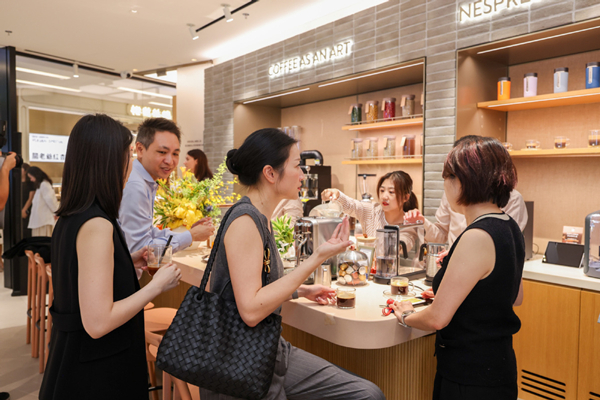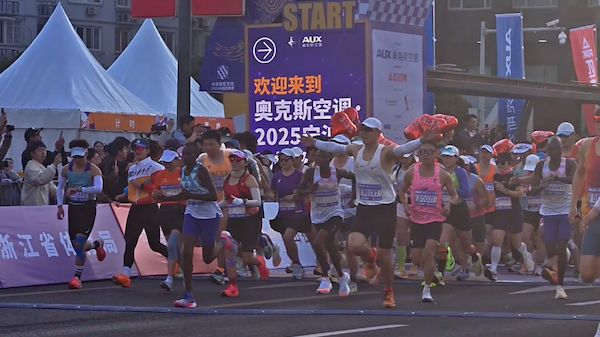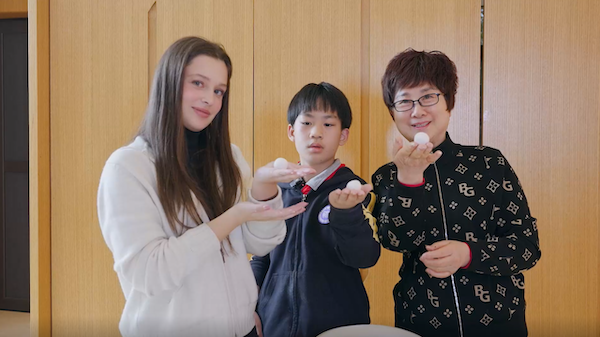Coffee culture percolating in popularity

Consumers visit a Nespresso store at a mall in Shanghai in November. [Photo/China Daily]
Coffee culture is rapidly percolating in popularity in the Chinese market, fueled by a boom in cafes and takeout orders that has sparked fierce price wars and rapid innovations.
Yet, amid the froth and buzz, a quieter trend is brewing — at-home and workplace coffee consumption.
As for the capsule coffee sector, it holds steady promise, as more consumers embrace the convenience and quality of making coffee on their own.
Brands like Nespresso, a coffee unit of Nestle, are capitalizing on this shift, aiming to establish capsule coffee as a staple of daily life — whether at a desk, a living room table, a corner table in a restaurant or a hotel lounge.
Bernie Gao, a research analyst specializing in food and drink at the Mintel Group, a research institute, believes the capsule coffee market has ample growth potential, driven by rising coffee consumption and demand for consistent quality.
"Capsule coffee is increasingly appealing to office workers and younger consumers, penetrating further into various-tier cities," said Gao.
Viviana Sun, an event moderator in Shanghai, said that having a capsule coffee machine at home offers a more unique experience than coffee shops or take-out orders.
"I enjoy making coffee for friends when they visit. It is a gesture of hospitality and courtesy," she said. "Capsule coffee is great for preserving freshness and flavor, and it's easy to make. The used pods can also be recycled. It doesn't take up much space in the kitchen."
Nespresso, the capsule coffee business of Nestle, has adopted a strategy of premium positioning and embracing local touches in the Chinese market, aiming to have an edge amid the competition with the country's on-premise coffee and tea sectors.
One of its flagship stores in Shanghai is situated in a crowded corner with Starbucks and Manner, two coffee chains in the country, representing a vivid "triangle" of on-premise beverage brands.
"We were here first," Matt Lu, business executive officer of Nespresso Greater China, said with a smile, seemingly amused yet unfazed by the competition.
The density of coffeehouses in Shanghai is now among the highest globally and continues to grow, he said.
But the increase in coffee consumers and consumption rates in China signal potential for Nespresso, he said.
Those who order coffee at cafes are likely to enjoy it at home or at the office as well, Lu said, adding: "This opens up more opportunities for us. I'm optimistic about our potential as a coffee machine and capsule business."
Having seen the growth potential, Nespresso has scaled up its retail strategy since September.
Nestle's third quarter fiscal report shows that coffee was the largest growth contributor with mid-single-digit growth, supported by the three leading coffee brands — Nescafe, Starbucks and Nespresso.
The company operates 42 directly owned stores, with more than 10 opened this year alone.
"Next year we plan to open more stores across more cities, especially in southern and western China," said Lu.
At its store in Shanghai, the ambiance is set with beige-painted walls, soft lighting and vibrant capsules displayed like rows of crayons.
"In-home coffee solutions, the core of our business, have been a way of life in Europe for years. But when we entered the Chinese market, it was still a novel concept," said Lu.
"Now, 12 years since I joined the company, Chinese consumers are becoming more aligned with their peers in Europe and the US," Lu said.
According to Zero Power Intelligence Group, Europe leads the global capsule coffee machine market, accounting for over 40 percent of market share, with North America close behind at about 30 percent. The Asia-Pacific and Latin American regions are among the fastest-growing markets.
The report said the global capsule coffee machine market reached around $18 billion in 2023 and is expected to grow to $23 billion by 2026, with a compound annual growth rate of 5-6 percent. In China, the market is expanding steadily, reaching 3 billion yuan ($414 million) in 2023, a year-on-year increase of 13.69 percent.
Within the sector, rivalry is heated.
By units sold in the Chinese market, Nestle SA leads the market, followed by brands like domestic brand Joyoung and Italy's De'Longhi, according to Euromonitor International.
Their business model is mainly based on the repeat buying of its coffee capsules. Localization and innovations are two drivers for boosting sales of capsule sleeves.
The company offers over 30 types of Original coffee, 30 Vertuo coffee, 14 professional options and limited editions featuring rare varieties from around the world. The brand also produces coffee machines that deliver a precisely portioned cup with each capsule.
Even the size of capsules has been adapted in recent years to local tastes and habits.
When Nespresso entered the Chinese mainland market in 2007, it introduced its Original series, primarily focused on espresso-style coffees between 40 milliliters and 110 ml. By 2014, the company launched its Vertuo series in China to meet growing demand for larger servings, ranging from 230 ml to 414 ml.
"Around 93 percent of Chinese consumers prefer a larger cup — typically over 200 ml — to start their day," said Lu.
On innovations in coffee and packaging, Lu said they have constantly created limited-edition capsules from rare plantations that enhance cultural relevancy and help raise product appeal.
In-store experience also matters to connect with consumers and stimulate the imagination.
The brand has worked with a film festival that supports young filmmakers in China for five years. At stores, visitors are invited to sit and view short films while sipping a coffee.
The company also holds book club events where people gather in the evening to read alongside authors.
"We aim to create moments that resonate, making coffee a companion during experiences where people feel emotionally connected to art," Lu said.
Beyond retail, Nespresso has also expanded into modern trade, hospitality and office spaces.
The brand has set up 15 pop-up stores at Sam's Clubs (Walmart's high-end membership stores) and the second batch of 11 such stores within Sam's is in the pipeline.
The company also supplies coffee to five-star hotels and office buildings.
Nespresso now serves more than 170,000 hotel rooms, executive suites and restaurants. The company's focus on sustainability gives it an edge in corporate settings.
"Companies have ESG goals, and our process offers portioned coffee without water or electricity waste, positioning us favorably for procurement," said Lu.
However, challenges remain, such as the high cost of capsule machines, low consumer awareness and lack of brand loyalty, which require significant investment in education and brand building, analyst Gao added.
"The rapid development of on-premises coffee and lower-price strategies have fueled a strong value orientation among local consumers," Gao said. "Alternative coffee devices like espresso makers and hand-brew pots are also capturing a share of the market."

 China welcomes global travelers with open arms
China welcomes global travelers with open arms  Kharitonova's running story in Ningbo
Kharitonova's running story in Ningbo  Voices from starting line
Voices from starting line 


